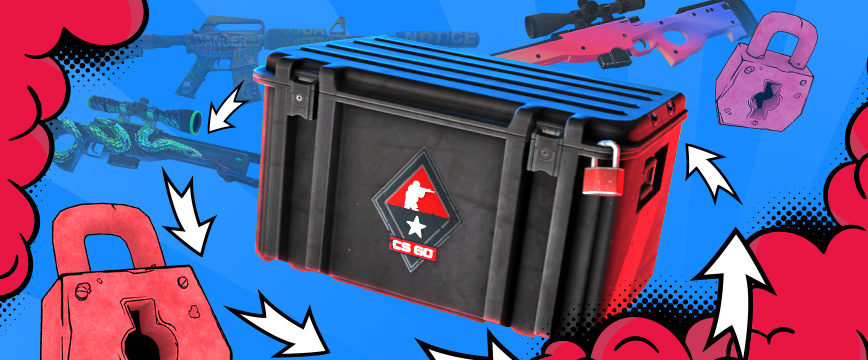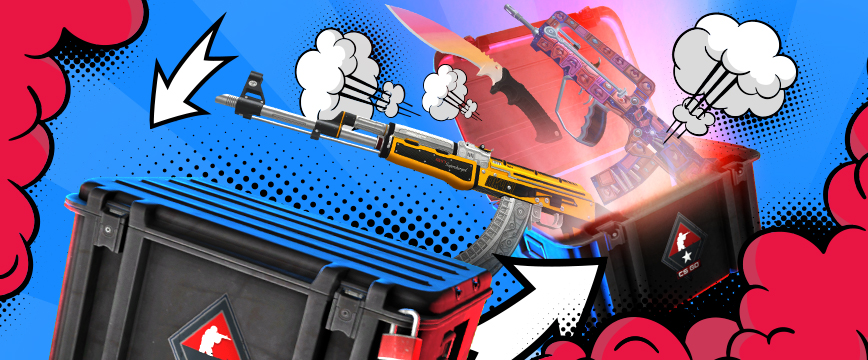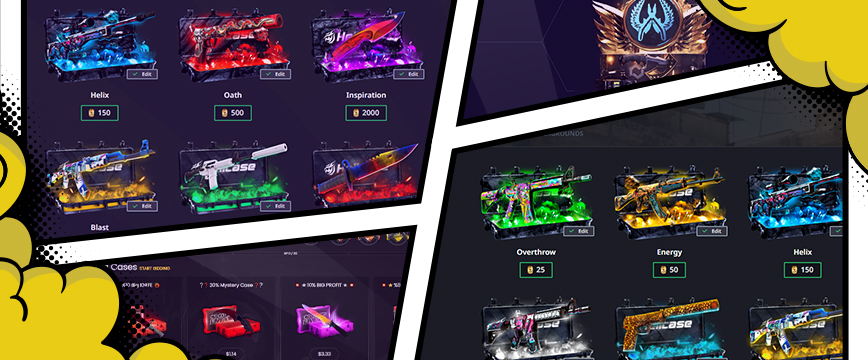Loot boxes are virtual containers in video games that players can either buy or earn, containing a random assortment of items. These items can be purely cosmetic, like character or weapon skins, or can offer gameplay advantages, such as powerful weapons or unique gear. The appeal of loot boxes lies in the unpredictability of their contents, echoing the excitement and mechanics of gambling.
Originating from the gacha mechanics in Japanese mobile games of the early 2000s, loot boxes were designed to monetize free-to-play mobile games by offering players the chance to obtain virtual items for a fee. This model expanded globally, finding its way into high-budget games as a method to supplement game development costs and generate a continuous stream of revenue. Prominent games like “Overwatch,” “FIFA” and “Star Wars Battlefront II” have incorporated loot boxes, which have become a significant feature in the gaming industry.
However, the rise of loot boxes has not been without controversy. Loot boxes have attracted scrutiny and regulatory attention because they closely resemble gambling. The main concern is their potential to foster gambling-like behavior, which can lead to addiction, especially among younger players who are more vulnerable.
Reacting to these concerns, several countries have moved to regulate loot boxes under their gambling laws. For instance, Belgium and the Netherlands have enforced stringent restrictions, categorizing loot boxes as gambling. Meanwhile, other nations like the UK and the US are still evaluating their stance, focusing on consumer protection laws and considering new regulations specific to digital gaming. But information and rules are constantly updated, which can always be found here.
What is a Loot Box?
Loot boxes have emerged as a prominent element in contemporary gaming, offering players the opportunity to obtain a variety of in-game items through randomized rewards. These digital crates often require a key or purchase to unlock and can contain anything from cosmetic enhancements to gameplay advantages. Good example of such loot boxes – Counter-Strike 2 (earlier CS:GO). Their appeal lies in the thrill of chance, evoking anticipation similar to unwrapping a mystery gift.
Behind the scenes, the mechanics of loot boxes involve intricate algorithms that dictate the likelihood of receiving different items, influenced by factors such as rarity and value. This element of unpredictability keeps players engaged and encourages ongoing participation in pursuit of coveted or rare items. Additionally, loot box design incorporates psychological principles such as variable reward schedules, which sustain player interest and promote repeated engagement.
In games like CS2, loot boxes take the form of cases containing a variety of cosmetic items like weapon skins and stickers. These cases can be acquired through gameplay or purchased from the in-game store. The allure of acquiring visually appealing and rare skins fuels player engagement, motivating many to invest time and money in opening cases to acquire their preferred items.
However, loot boxes have attracted criticism due to their resemblance to gambling, as they share similar mechanics centered around chance and reward. Concerns have been raised about the potential exploitation of vulnerable players, particularly minors, as well as the lack of transparency regarding item drop rates. Consequently, regulatory bodies in some regions have implemented measures to regulate or restrict the use of loot boxes in gaming.
Despite the controversies surrounding them, loot boxes remain a significant feature in numerous games, serving as a substantial revenue stream for developers and offering players a source of excitement and entertainment. An understanding of the mechanics and psychological underpinnings of loot boxes is crucial for both players and regulators to ensure ethical and responsible integration within the gaming industry.
The Gamble Debate
Loot boxes have ignited a fervent debate due to their gambling-like elements and the psychological impacts they may have on players, especially younger ones. This discussion delves into the mechanics of loot boxes that resemble gambling and explores their potential consequences on player behavior and mental health.

Gambling-Like Mechanics
Loot boxes operate much like gambling; players spend money without knowing what they will receive, hoping for a valuable item. This element of uncertainty and the prospect of a significant reward mimic the risk and thrill associated with traditional gambling activities. The excitement of opening loot boxes parallels the suspense and thrill of betting in casinos, where outcomes are unpredictable and high stakes.
Incorporating these mechanics into games complicates the experience by making them a regular aspect of gameplay, often making it difficult for players to distinguish between gaming and gambling. This integration can heighten the psychological engagement and may lead to behaviors typically linked to gambling addiction, such as the urge to spend more in hopes of obtaining more valuable rewards.
Psychological Impact
The impact of loot boxes is particularly profound on younger players, who are more vulnerable and susceptible to developing habits that could lead to gambling addiction. Loot boxes play on cognitive biases—such as the illusion of control, where players feel they can influence the outcome, and the near-miss effect, where almost winning encourages continued play.
These dynamics are intensified by the variable ratio reinforcement schedule used in loot boxes, which is highly effective at promoting repeated behavior by offering rewards at unpredictable intervals. This can lead to persistent gaming and increased time spent in pursuit of the elusive thrill of winning rare items.
Regulatory Concerns and Ethical Implications
The gambling-like nature of loot boxes has drawn attention from regulators and policymakers globally, leading some to regulate them under gambling laws and restrict their availability. There’s a significant ethical concern regarding the use of potentially exploitative monetization strategies in games accessible to children and teenagers.
The gaming industry is urged to adopt more responsible practices, such as implementing spending limits, transparently disclosing odds, and enforcing age restrictions to safeguard young players.
Global Regulations on Loot Boxes
The regulatory landscape surrounding loot boxes varies greatly among different nations and regions, reflecting diverse approaches and cultural perspectives on gaming practices.
- Europe
European Union, in 2018 Belgium has adopted a stringent stance by prohibiting certain forms of loot box mechanics, likening them to gambling activities. Similarly, the Netherlands has engaged in legal disputes with game developers over loot box regulations, emphasizing the importance of transparency and consumer safeguarding. Ongoing discussions about loot box regulations are also taking place in Finland and Spain, where policymakers are exploring various strategies to mitigate concerns regarding their impact on players.
- North America & United States
In North America, the United States has witnessed federal court rulings addressing loot box mechanics, although comprehensive regulatory action at the federal level remains limited. Nevertheless, individual states have taken measures to regulate loot boxes, with some enacting legislation aimed at safeguarding consumers, especially minors. Canada has also experienced class action lawsuits targeting game developers over loot box practices, underscoring mounting apprehensions regarding their legality and ethical implications.
- Asia-Pacific
Across the Asia-Pacific region, China has enforced rigorous regulations on loot boxes, mandating that game developers disclose the odds of obtaining items and impose spending limits on in-game purchases. In 2012 Japan has historically adopted a distinct approach to loot box mechanics, focusing on the “Complete Gacha” (“kompu gacha”) practice, which encourages players to spend more money to complete item sets. Recent developments in Singapore and South Korea indicate a growing awareness of loot box concerns, with discussions centered on consumer protection and responsible gaming practices.
- Australia
Australia is contemplating forthcoming reforms that could significantly impact games featuring loot boxes, aiming to enhance transparency and accountability within the gaming industry and address worries about potential harm, particularly among young players.
- Latin America
In Latin America, Brazil has taken legal measures against game developers regarding loot box practices, reflecting broader apprehensions regarding consumer rights and gambling-like elements in gaming. The region displays potential for new regulations aimed at tackling these concerns and ensuring the ethical and responsible integration of loot box mechanics in games.
Safe Practices and Responsible Gaming
Ensuring safe practices and promoting responsible gaming are essential focuses within the gaming industry, particularly regarding activities involving gambling-like features such as loot boxes. Independent organizations play a pivotal role in advancing responsible gaming standards and addressing associated risks. Entities like the Responsible Gambling Council (RGC) are leading efforts in this regard, advocating for measures aimed at safeguarding players’ safety and welfare.
The RGC, as a non-profit entity, is committed to preventing problem gambling and its adverse effects. Its mission encompasses a range of initiatives geared towards cultivating responsible gaming behaviors and assisting individuals impacted by gambling-related challenges. Through educational campaigns, research endeavors, and awareness-raising activities, the RGC strives to empower players with the necessary knowledge and resources to make informed decisions regarding their gaming habits.
An integral aspect of the RGC’s work involves providing support services and resources for individuals encountering issues related to gambling, including those exacerbated by loot box mechanics. These resources commonly include helplines, online forums, and informative materials tailored to offer guidance and aid to those in need.

The RGC collaborates closely with various stakeholders across the gaming industry, including game developers, platform providers, and regulatory bodies, to develop and enforce responsible gaming policies and practices. By fostering dialogue and collaboration among these stakeholders, the RGC endeavors to establish standards and guidelines that promote player well-being and minimize potential harm.
Through its dedicated efforts, the Responsible Gambling Council endeavors to cultivate a gaming environment prioritizing player welfare while preserving the enjoyment and recreational value of gaming experiences. By raising awareness, delivering support, and advocating for responsible gaming principles, organizations like the RGC contribute significantly to fostering a healthier and more sustainable gaming landscape for players of all ages.
Industry and Regulatory Efforts
As concerns over loot boxes in video games continue to rise, the gaming industry and regulatory bodies are intensifying their efforts to address these issues. Game developers, publishers, and platforms are increasingly committed to enhancing transparency, implementing robust parental controls, and enforcing age restrictions to foster a safer gaming environment.
These measures aim to protect consumers, particularly young players, and ensure a responsible gaming experience.
- Transparency
A key initiative in addressing loot box concerns is the push for greater transparency. Developers are now more regularly disclosing the odds of obtaining specific items from loot boxes, enabling players to make more informed choices about their purchases. This approach is becoming widespread across various platforms and is often reinforced by regulatory demands in certain regions. For example, games like “FIFA” now provide probabilities that reveal the likelihood of acquiring specific types of players, helping gamers understand their chances before making a purchase.
- Age Restrictions
Another critical focus is the enforcement of age restrictions. More rigorous age verification systems are being implemented to prevent underage players from accessing games with gambling-like elements. This effort is partly driven by the need to meet legal standards in regions where loot boxes are governed by gambling laws. Age restrictions serve not only to limit access to potentially risky content but also to demonstrate the industry’s dedication to responsible gaming.
- Parental Controls
To further protect younger gamers, numerous companies are enhancing their parental control options. These controls allow parents to limit how much their children can spend within games, including on loot boxes. They also help manage screen time and restrict access to games based on age ratings, ensuring that children encounter only age-appropriate content. Platforms such as PlayStation or Xbox offer extensive family management settings that parents can tailor to their family’s preferences.
- Collaboration with Regulatory Bodies
The industry’s proactive measures often involve collaboration with regulatory bodies to ensure compliance with local and international laws. This cooperation includes dialogues with gambling commissions and consumer protection agencies to align game mechanics with established consumer safety best practices. For instance, the International Age Rating Coalition (IARC) offers a unified framework for age classification, aiding developers in maintaining consistent age ratings globally.
Tips for Gamers
As the gaming industry continues to grow and change, it’s crucial for both gamers and parents to be well-informed about practices that promote safe gaming. Here are essential tips and strategies to help identify risky behaviors, establish limits on gaming and spending, and encourage discussions about responsible gaming.
- Educate Yourself About Game Mechanics: Gain a thorough understanding of how loot boxes, in-game purchases and the probabilities of winning items work. This knowledge is crucial for making informed decisions about engagement with these elements.
- Recognize Risky Behavior: Be alert to signs of excessive gaming, such as spending many hours online, neglecting responsibilities or social interactions, and feeling distressed or irritated when not playing. Monitor your spending on gaming, particularly if you find yourself frequently buying virtual items like loot boxes, or if these purchases become compulsive.
- Set Limits on Gaming and Spending: Utilize in-game tools or third-party applications to enforce strict limits on both the duration of gaming sessions and the amount spent on in-game purchases. Many gaming platforms provide features to help manage these aspects.
Tips for Parents
- Set Clear Gaming Guidelines: Define explicit rules regarding the amount of time and money that can be dedicated to gaming. Discuss these rules with your child to ensure they understand and adhere to them. Implement parental controls available on most gaming consoles and platforms to practically enforce these guidelines.
- Foster Open Communication: Engage regularly in conversations with your child about the games they play, their gaming experiences, what they enjoy, and who they interact with online. Discuss the value of money concerning in-game purchases, stressing the importance of budgeting and understanding the nature of digital goods.
- Educate About Online Safety and Responsibility: Instruct your child on the importance of maintaining online privacy, the dangers of sharing personal information, and how to interact respectfully and safely with others online. Encourage them to think critically about advertising and the marketing strategies used in games, especially regarding loot boxes and microtransactions.
- Recognize Signs of Unhealthy Gaming: Watch for any indications of excessive gaming in your child, such as impacts on their school performance, sleep patterns, and interactions with family and friends. Look out for notable emotional changes linked to gaming, like frustration or anger during or after game time.

The Future of Loot Boxes and Gaming
As the gaming industry continues its evolution, the future trajectory of loot boxes and microtransactions is shaped by a variety of emerging trends and shifting perspectives. Here is an overview of what to expect:
Emerging Trends
- Alternative Monetization Models: The industry is exploring alternative monetization models as alternatives to traditional loot boxes and microtransactions. Subscription-based services, season passes and cosmetic-only purchases are gaining traction as viable alternatives.
- Transparency and Disclosure: There is a growing emphasis among game developers and publishers on transparency and disclosure regarding loot box mechanics, odds, and potential risks. These efforts aim to empower players with the information needed to make informed decisions about their gaming experiences.
Potential Legal and Social Impacts
- Legislative Efforts: Ongoing legislative endeavors worldwide are shaping the regulatory landscape for loot boxes and gaming. Proposed regulations aim to establish clear guidelines for loot box mechanics, including requirements for disclosure, age restrictions, and consumer protection measures.
- Public Discourse: Heightened public awareness and discussion surrounding loot boxes have prompted conversations about their ethical implications and potential risks. Concerns, particularly regarding gambling-like elements, have spurred calls for stricter regulations and industry accountability.
Recommendations
As the gaming industry evolves with the increasing presence of loot boxes and microtransaction mechanisms, it is imperative for all stakeholders—gamers, parents and industry leaders—to actively contribute to shaping a responsible future for gaming. This call to action emphasizes the importance of informed decision-making by gamers, proactive engagement by parents and ongoing vigilance and adaptation by industry professionals.
For Gamers: Informed Decision-Making
- Cultivate Healthy Habits: Gamers should introspect on their spending and gaming habits, identifying signs of excessive spending or potential gaming addiction. Establishing personal limits and sticking to them can mitigate potential risks.
- Advocate for Transparency: Players are encouraged to demand greater transparency from developers about the odds of loot boxes and the associated costs. Supporting games that adhere to clear and fair practices can catalyze positive changes across the industry.
For Parents: Proactive Engagement
- Get Involved: Parents should actively engage with the games their children play and learn about the various monetization strategies, including loot boxes. This involvement enables parents to guide their children towards making informed decisions.
- Educate and Communicate: It is vital for parents to teach their children about the value of money and the psychological tactics that games may employ to promote spending. Regular conversations about the ethical aspects and impacts of gaming purchases can cultivate a responsible attitude toward gaming.
For the Gaming Industry: Vigilance and Adaptation
- Lead with Ethics: The gaming industry must uphold ethical business practices by creating games that are transparent and fair. Steering clear of predatory monetization practices can foster trust and maintain long-term player relationships.
- Innovate Responsibly: As the industry explores new revenue models, it should aim to innovate in ways that do not exploit players. Developing alternative monetization strategies that provide value without compromising ethical standards is crucial.
- Engage with Regulators: Constructive engagement with policymakers and regulatory bodies can help shape regulations that protect consumers while fostering creative and commercial freedoms. Active participation in legislative discussions ensures that industry perspectives and player welfare are balanced and considered.
Conclusion
This comprehensive guide has provided an in-depth exploration of the intricate world of loot boxes in gaming. By tracing their emergence, discussing their focal point in gaming, examining global regulations, and dissecting their psychological impact, the guide aims to empower readers with a deeper understanding of this controversial gaming feature.
Loot boxes, while offering excitement and entertainment to players, have also sparked concerns due to their resemblance to gambling and potential negative effects, especially on younger audiences. As regulatory bodies worldwide grapple with the ethical implications and legal ramifications, it becomes imperative for the gaming industry to adopt responsible practices.
The guide emphasizes transparency, age restrictions, parental controls, and collaboration with regulatory bodies as crucial measures to ensure a safer gaming environment. Moreover, it provides valuable tips for both gamers and parents to identify risky behaviors, set limits, and foster open communication.
Looking ahead, the future of loot boxes and microtransactions will likely be shaped by emerging trends, such as alternative monetization models and a growing emphasis on transparency and disclosure. Legislative efforts and public discourse will continue to influence the regulatory landscape, prompting the need for ongoing dialogue and collaboration among stakeholders.
By promoting responsible gaming practices and raising awareness of the complex issues surrounding loot boxes, this guide strives to contribute to a healthier and more informed gaming ecosystem for players of all ages. Our honest reviews of CS: GO and CS2 case opening sites provide helpful tips, empowering players of all ages to feel confident in their gaming choices.
FAQ Questions
How Do Different Countries Regulate Loot Boxes?
Countries around the world regulate loot boxes differently, with some nations classifying them as gambling and implementing strict controls or complete prohibitions, while others continue to deliberate on their regulatory approach. For instance, Belgium and the Netherlands have enacted bans on loot boxes that involve real money transactions due to concerns over gambling, whereas in the United States and Canada, the regulation of loot boxes is handled more variably, often at the state or provincial level.
Can Loot Boxes Be Considered A Form Of Gambling?
The categorization of loot boxes as gambling differs across jurisdictions, influenced by varying legal definitions and interpretations. While some assert that loot boxes bear resemblances to conventional gambling because of their randomized outcomes and the possibility of financial gain or loss, others argue that they do not satisfy the criteria for gambling outlined in current legislation.
What Are Safe Gaming Practices When Dealing With Loot Boxes?
When engaging with loot boxes, safe gaming practices involve establishing spending caps to prevent overspending and understanding the chances of winning specific items to facilitate informed choices. It’s also important to schedule regular gaming breaks and be vigilant for any signs of gambling tendencies to ensure a balanced and healthy approach to gaming.
How Can Parents Ensure Their Children’s Gaming Practices Are Safe?
Parents can safeguard their children’s gaming habits by staying involved in their gaming activities, establishing suitable boundaries for screen time and expenditures, and having candid conversations about responsible gaming behaviors. Moreover, utilizing parental control tools offered by gaming platforms and educating kids about online safety and responsible gaming can contribute to creating a positive gaming atmosphere.
What Steps Are Being Taken By The Gaming Industry To Address Loot Box Concerns?
To address concerns about loot boxes, the gaming industry is enhancing transparency by disclosing the probabilities of winning specific rewards and strengthening parental controls along with setting spending limits. Furthermore, in response to both regulatory challenges and consumer feedback, several companies are shifting towards alternative monetization models that avoid reliance on random outcomes.
Are There Any Global Standards For Loot Box Regulations?
Currently, there is no globally recognized standard for regulating loot boxes. Varying approaches and regulations exist across different countries and regions, resulting in a lack of uniformity in the handling of loot box issues on an international level.
How Can Gamers Stay Informed About The Legal Status Of Loot Boxes?
Gamers can keep up-to-date with the legal status of loot boxes by regularly reviewing news from gaming industry sources and official government communications within their region. Engaging with gaming community forums and monitoring discussions on social media can also offer valuable updates and perspectives on legislative developments and shifts in industry approaches to loot boxes.
What Role Do Organizations Like The Responsible Gambling Council Play In Loot Box Regulation?
Groups such as the Responsible Gambling Council are instrumental in championing responsible gaming behaviors and addressing the potential hazards linked with loot boxes. They aid in fostering transparency, offering support to impacted individuals, and working alongside various parties to establish industry standards that promote ethical engagement with loot boxes.
What Future Trends Can We Expect In The Regulation Of Loot Boxes?
Anticipated future trends in loot box regulation may involve the implementation of tighter and more detailed legal frameworks as authorities work to mitigate public worries about gambling elements in video games. There could be an international shift towards enhanced clarity in loot box operations, potentially requiring explicit disclosure of winning probabilities and contents to empower users with better information for decision-making.



